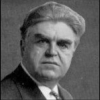John L. Lewis

John L. Lewis
John Llewellyn Lewiswas an American leader of organized labor who served as president of the United Mine Workers of Americafrom 1920 to 1960. A major player in the history of coal mining, he was the driving force behind the founding of the Congress of Industrial Organizations, which established the United Steel Workers of America and helped organize millions of other industrial workers in the 1930s. After resigning as head of the CIO in 1941, he took the Mine Workers out...
NationalityAmerican
ProfessionLeader
Date of Birth12 February 1880
CountryUnited States of America
Ordinary problems affecting wages, hours, and working conditions, in most instances, will quickly respond to negotiation in the council room.
Five of the corporations in the steel industry elected to resist collective bargaining and undertook to destroy the steel workers' union.
Increased interest and participation by labor in the affairs of government should make for economic and political stability in the future. Labor has a constitutional and statutory right to participate.
No tin-hat brigade of goose-stepping vigilantes or bibble-babbling mob of blackguarding and corporation paid scoundrels will prevent the onward march of labor, or divert its purpose to play its natural and rational part in the development of the economic, political and social life of our nation.
If there is to be peace in our industrial life let the employer recognize his obligation to his employees - at least to the degree set forth in existing statutes.
Let the workers organize. Let the toilers assemble. Let their crystallized voice proclaim their injustices and demand their privileges. Let all thoughtful citizens sustain them, for the future of Labor is the future of America.
Workers have kept faith in American institutions. Most of the conflicts, which have occurred have been when labor's right to live has been challenged and denied.
Out of the agony and travail of economic America the Committee for Industrial Organization was born.
The labor movement is organized upon a principle that the strong shall help the weak.
While the men of the steel industry were going through blood and gas in defense of their rights and their homes and their families, elsewhere on the far-flung C.I.O. front the hosts of labor were advancing and intelligent and permanent progress was being made.
Labor, like Israel, has many sorrows. Its women weep for their fallen and they lament for the future of the children of the race. It ill behooves one who has supped at labor's table and who has been sheltered in labor's house to curse with equal fervor and fine impartiality both labor and its adversaries when they become locked in deadly embrace.
I have pleaded (labor's) case, not in the quavering tones of a feeble mendicant asking alms, but in the thundering voice of the captain of a mighty host, demanding the rights to which free men are entitled.
The men in the steel industry who sacrificed their all were nor merely aiding their fellows at home but were adding strength to the cause of their comrades in all industry.
This is true only because the purposes and objectives of the Committee for Industrial Organization find economic, social, political and moral justification in the hearts of the millions who are its members and the millions more who support it.